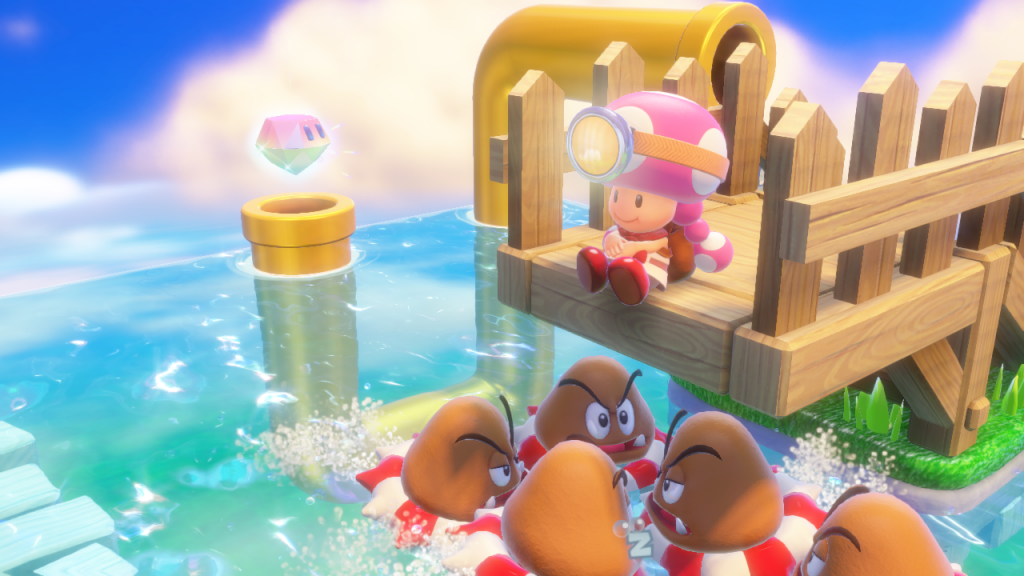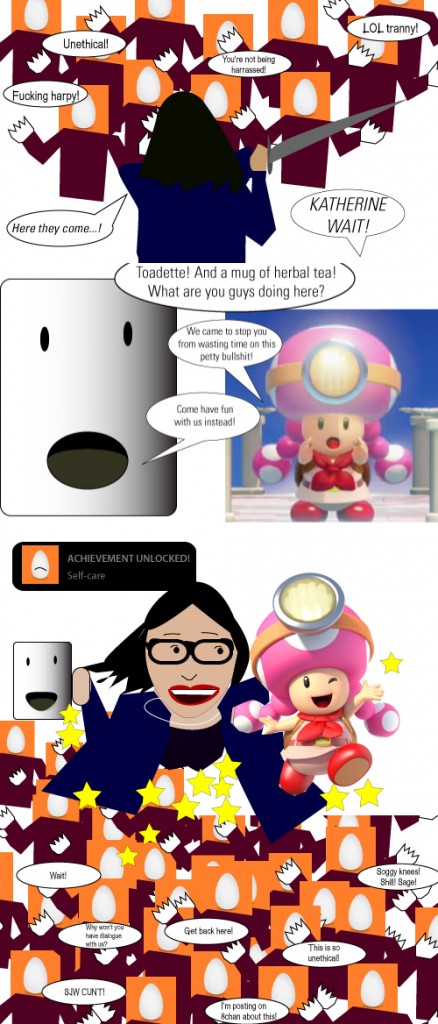Being a gaming critic (particularly one who often courts controversy by being a feminist critic) I always feel “switched on” when I play even particularly fun or long-awaited games. It’s increasingly difficult just to let go and lose myself in the flow of repetitive motion, say, or feel completely immersed in a story. The watery metaphors are apposite: gaming should create that oceanic sensibility of being virtually embodied in that great Elsewhere of digital reality. The challenge, however, is that it becomes particularly tricky to get there when your critical faculties keep implicitly reminding you of the inherent artifice of the experience, and its many attendant flaws — narrative and mechanical.
Elsewhere becomes elusive as you are continually reminded of how it is illusive. The farragoes that attend feminist gaming criticism certainly don’t help matters; it’s easy to get bogged down and easier still to become cynical. For those of us who try to find something redemptive in gaming, the job becomes even harder — and this has to be the single worst time to be a feminist that believes in the beauty and joy of gaming, to be quite blunt.
And so in the deep of night, I find myself sipping tea and wondering if being plugged into the matrix of gaming is even healthy for me anymore. Can it even be self-care in times like these when around every polygon corner lurks another reminder of traumas shared by friends and colleagues alike?
Well, yes, as it turns out. Hope came in the form of bouncing pink pigtails. Made of fungus, to be precise.

Enter Captain Toad. The game is a simple one on its surface. You play the eponymous Captain Toad or Toadette (who deserves her own snazzy title, if you ask me; Spore Commander, maybe), and futz around a densely packed 3D puzzle of a map, collecting treasure on the way. Though set in the relentlessly cute Mushroom Kingdom of Mario Bros. fame, the gameplay centers more on strategy and problem solving than platforming skills.
The irrepressible adorableness of the game charges past your defences and performs the strange but pleasing mechanical function of helping you focus. It wasn’t just the small screen of the Wii U handheld but the simple unity of form, function, and cute that made the game work as a distraction par excellence. Its challenges are in the form of three dimensional brain-teasers that work like a combination of mazes and adventure game puzzles. They challenge and stimulate without being so obtuse that one becomes frustrated; a forgiving balance was struck.

My partner threw this together in a couple of minutes to seduce me away from sparring with Twitter trolls. Hey, it worked!
Amid that focus and fun I found an island of ludic isolation amidst the various online storms I found myself swept up in. So much so that every time I got dragged back into a Twitter fracas, my partner admonished me and told me to go back to playing Captain Toad. She even threw together a comic to impress the idea on me. She was seeing something I hadn’t quite consciously realized — there was something special about the game’s innocence that gave it a relaxing resonance to match a steaming mug of chrysanthemum tea.
Bounding about as a cute mushroom girl (or lad), collecting stars and solving puzzles became my self care, in a way other video games couldn’t be. Even when I wasn’t down in the dumps, there’s a very different virtual embodiment that attends playing a more “serious” game like Shadowrun: Dragonfall that involves and exhausts you in an altogether different way, by design. You strategize combat, you immerse yourself in stories slick with the blood of abuses, genocides, and intergenerational warfare. It creates a certain kind of beauty, but one that involves you differently, as a thinking adult open to a range of emotions, not so immature as to think “fun” is the only reason one experiences art.
Captain Toad speaks in a different register, the one that lulls you into relaxing your muscles and shedding the scarred armor that too many of us feminists wear to work every day. The reason that I and so many others find enjoyment here has a lot to do with gaming’s origins, and certain foundational ideas of what games are for, expressed in its mechanics, that we all keep coming back to again and again.
***
In the clamor to attack mobile games like Bejeweled or Angry Birds as being “too casual” or “not really games” — often gendering such games as “girly” — gamers sometimes seem to forget the origins of their own hobby. Amidst the record-breaking budgets of glossy franchises with photorealistic graphics made by armies of developers, that some of the most successful games out there keep it simple is a reminder of what makes gaming pleasurable.
Decades separate Tetris from Fruit Ninja or Bejeweled but they are, at heart, the same unpretentious, focused, skill-based distractions that gave birth to gaming as a mass medium.
Even more “hardcore” gamers often recapitulate that phylogeny of gaming as a medium in their own lives, retreating to those games that offer the comforts of long-ago childhoods. People — whole masses of people — take comfort in these games precisely for that reason. They focus us on brain-teasing tasks that shelter us from pain; looked at that way, it’s hard to begrudge anyone a bit of Flappy Bird.
The surge in casual gaming is sometimes read as the death of “good games” and the end of an industry amidst a sea of Farmville addicts seeking mindless enjoyment, and women players polluting the gaming world with our casual cooties. But the comfort gaming offers comes in many forms, and it first came in the form of simple pleasures like Pong and Space Invaders. Games that once required a hulking arcade console to play can now fit in the palms of our hands.
As I played Captain Toad I realized that casual gaming — that ever-ready cudgel so often used to beat women gamers — is not about the end of gaming, but rather its rebirth. Untold millions are finding a kind of self-care experience not unlike Tetris players found in the ’80s and ’90s. Tight, focused games that eschew clichés and engage the player with good humor — like Portal did a few years back — make gaming bigger, not smaller.
And they help me breathe just a little easier.
Join the Conversation